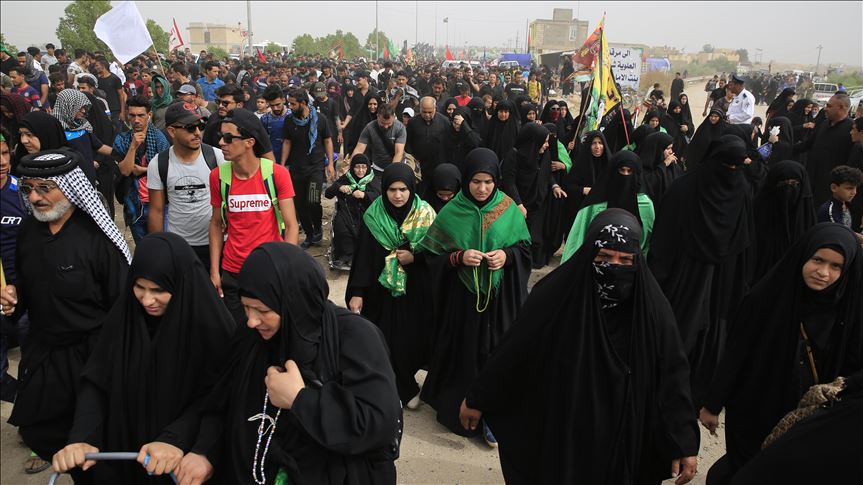Millions march to Iraq for Arbaeen pilgrimage
Millions of Shia from around the world take part in march to Karbala to commemorate Imam Hussain, grandson of Islam's Prophet
 file photo
file photo
TEHRAN
Braving intense heat, sand storms, and precarious security situation, millions of Shia Muslims from different corners of the world converge at one place and cover vast swathes of land by foot.
This annual event that has become a talking point in recent years is known as Arbaeen march, which takes place 40 days after Ashura, the day famous for the tragic event of Karbala, when Hussain, the grandson of Islam's Prophet, was killed on October 10, 680.
The marathon walk on an 80 km stretch from Najaf to Karbala in Iraq took place this week with the participation of millions of people from many countries, including Turkey.
Arbaeen Walk has been widely described as the biggest annual gathering with participants from across the globe, according to Iraqi officials. The crowd has been swelling each year.
People joining the march proudly hold aloft flags of their respective countries and march in unison. The majority of them are from Iran, Lebanon, Azerbaijan, Pakistan, India, Turkey, Syria, Indonesia, and some European countries.
An official in Iraq's Interior Ministry told Anadolu Agency that this year's turnout has been unprecedented as free visas were issued to the Iranian pilgrims.
The whole journey of about 50 miles from Najaf to Karbala is marked with 1,400 poles, corresponding with the number of years that have passed since the Karbala events.
It takes about two days and two nights to complete the walk depending on the pace and stoppages in between.
Awe-inspiring
For one week before Arbaeen, every day tens of thousands begin the walk, including women, children, and the elderly. They walk seamlessly and untiringly from one city to another, day and night, in an exhibition of extraordinary resolve to uphold the objectives of the walk.
Raghib Hussain came all the way from Gilgit, Pakistan, to participate in this year's walk. He calls it a life-changing experience.
"This is a melting pot here. Different nationalities, different cultures, different languages. What unites us all is our common cause -- to save humanity from all kinds of evils," he told Anadolu Agency.
"I can't forget these scenes. It's been an emotional experience."
Anna Fatemeh from Azerbaijan said she sees it more than just a religious gathering.
"I have been coming for the past three years and each time the experience has been awe-inspiring," she told Anadolu Agency.
"This walk belongs to everyone who sees himself or herself as a campaigner of truth, justice, and freedom. It's a walk for humanity."
Rallying cry
In recent years, the rush of pilgrims on Arbaeen has gone up tremendously. Even non-Muslims have been joining the walk.
"I had been planning to join this walk for two years and finally I made it," said James, a university student in his 30s from the U.K.
Ali Mehdi, who came from Houston, U.S., said: "Karbala teaches us to speak truth to the power and give voice to the voiceless.
"This walk is a rallying cry in support of the weak, powerless and oppressed everywhere," Mehdi told Anadolu Agency.
Since last year's march, the numbers have gone up. There are still lingering security concerns but Daesh threat and its affiliated groups have now been removed.
"The legacy of Karbala is the legacy of truth versus falsehood, right versus might, justice versus oppression, glory versus ignominy, so it is only fitting that a rally is dedicated to the oppressed of the world on Arbaeen," Sheikh Zarie Khormizi, an Islamic scholar from Iran, told Anadolu Agency during the walk.
Iraqi hospitality
In Najaf, where the walk begins, for more than a week, streets were teeming with people who had come from different parts of the world. Locals had set up stalls, serving visitors sweetened drinks, fruits and food.
Along the way from Najaf to Karbala, stalls had been set up by local residents, charities, mosques, and foreign aid groups to ensure no guest goes hungry or thirsty.
Cooks prepared vast quantities of stewed lamb, grilled fish, beans, fresh bread, and rice.
There were small makeshift tents lined with foam mattresses and woolen blankets for people to rest or sleep. For those tired, there were masseurs to give them quick and revitalizing massage. There were also mobile bathrooms for a quick shower and mobile ambulances in case of a medical emergency.
Days were relatively hot and nights extremely cold. At every step of the way, there were friendly hosts urging visitors to sit for a sweetened black Iraqi tea and snacks or stop for a nap.
"It's remarkable the way they treat guests on Arbaeen. These people have redefined the whole concept of hospitality, where a host takes honor in serving his guests who are complete strangers to him," Hussein Al-Hadi, a pilgrim from Lebanon, told Anadolu Agency.
At one small roadside stall on the way, a husband and wife in their 30s from a local village were serving tea and fresh dates to travelers.
Serving the guests, the husband told Anadolu Agency that it was a privilege for him.
"I save money every month from my meager earnings to spend them on guests during Arbaeen. I can starve myself to make sure our guests have no reason to complain."
For almost ten days, the people of Iraq open their hearts for pilgrims even though they have been facing their own economic problems.
"We want an end to corruption and we want jobs for unemployed, educated youth," Hussein al-Amiri, a student from Basra city, told Anadolu Agency.
"At the same time, we will continue to serve our guests, the Arbaeen pilgrims, in the best way possible."








